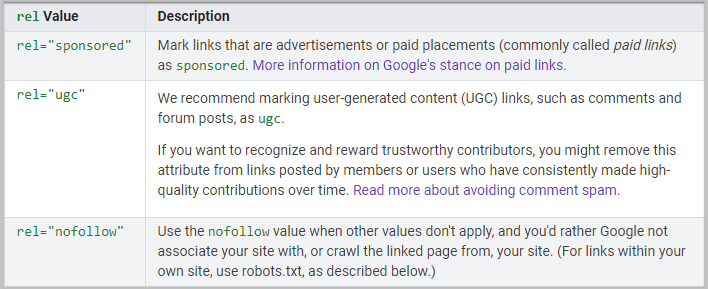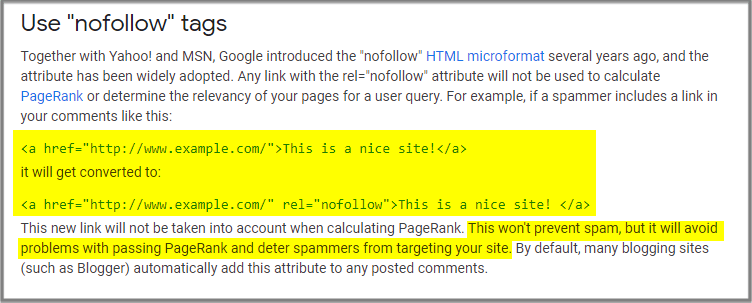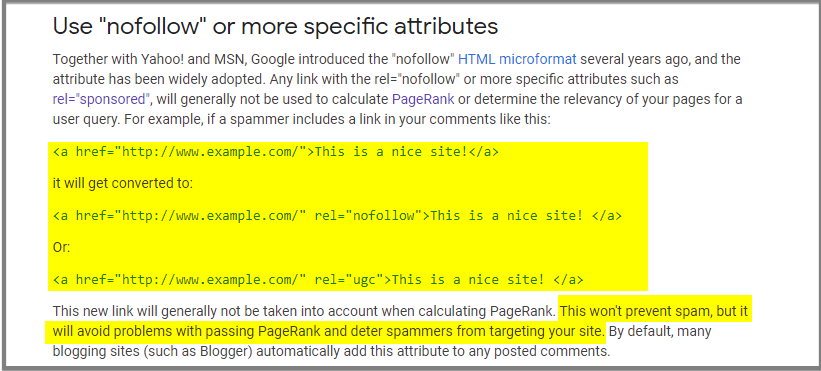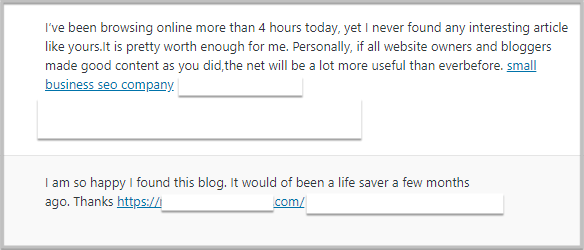Evolution of Nofollow- Introduction of UGC, Sponsored by Google
On September 10, 2019, Google made an official announcement regarding the evolution of nofollow and the introduction of two new link attributes that will help understand the nature of the links. These link attributes are
- rel=”sponsored”
- rel=”ugc”
This announcement was groundbreaking and took the SEO community by surprise. In this article, we will be discussing what are these new attributes, the reason behind this update, its impact on SEO and what do you need to do.
With that said, let’s dive into the details
History of nofollow
Google alongside Yahoo and MSN introduced the nofollow link attribute 15 years ago to fight against comment spam.
Back in the day to raise the rank of a website spammers used the tactic of comment spam where they used to submit linked comments. Here is an example of such comment.

Still today this practice is being followed and this step was taken to ensure the spammers get no benefit from public forums.
This announcement was released on Jan 2005 and it clearly stated
After this update rel=”nofollow” became one of the go-to ways or web standards to not associate your site with certain links and pass the ranking credit.
Platforms such as WordPress were quick to implement these changes and with the release of WordPress 1.5, nofollow was automatically assigned to user-submitted links.

When we talk about manipulating rankings, link schemes or paid links are also used to achieve it.
Google has clearly stated, using such links are considered as a violation of Google’s Webmaster Guidelines and can lead to a penalty. This includes any manipulative links to your site or outgoing links from your site.
Below mentioned are some activities that can result in a link scheme penalty.
- A very common activity that is considered negative is link exchange. This includes both “I link to you and you link to me” and pages created solely for the purpose of cross-linking. Here is an email of a recent one of many requests we received.

- Automatic link building using programs or services.
- Misusing guest posts, article submission, forum discussions, and similar activities by abusing anchor texts.
- Buying and selling links to boost rankings. This includes providing links in exchange for products, services or money.
This type of link building is often seen in sponsored posts where bloggers/ creators are paid or compensated in products where they either write a blog post and include a link in it or have to update an existing post with the link.
In most cases, creators do not get the choice of whether they want to attribute the link nofollow or not. This is a strict violation of the rules and can negatively impact the rankings of your site.
Here is an example.

This leads us to 2 questions
- Why am I telling you all this?
- Is this related to what we are discussing here?
Let me answer these questions one by one
Everyone wants to rank higher on Google and as quickly as possible. The above listed methods are shortcuts to disasters and not the key to success.
The search is a continuously evolving process and it involves the process of machine learning. When you use such activities you do see a short term positive impact but the penalty is inevitable.
It is always recommended to grow naturally with time and you will be rewarded in the long term.
Also, while I was creating this post I thought this could be a good opportunity to once again make the creators aware of what is right.
As far as the sponsored content is concerned, before the launch of 2 new attributes, Google has asked the webmasters to add rel=”nofollow” to the sponsored or ad link (this includes affiliate link or any other monetary links)


This screenshot was taken before this document was updated and we will be discussing all the changes a little later in this post.
The search is based on links. The 2 most common benefits of links are improving the navigation or reach of your page and increasing the Pagerank.
But,
Did you know?
Links also help in letting the search engines know about the content and the nature of the page. If you are wondering how this happens, let me explain it to you briefly
Frequently, while browsing the internet you may have seen web pages contain links that use anchor text. Here is an example.

What happens here is, when the bot/ crawler reach these anchored links it comes across 3 things
- Anchor text
- Attached link
- Attribute used
If the anchor text is optimized like in the screenshot above, it defines the content of the linked page. The attribute tells whether you want to vouch or associate your website with the linked page.
Earlier there were 2 attributes
- Dofollow
- Nofollow
If you haven’t assigned any value to the rel attribute, it was by default set to dofollow. And to tell the search engines not to follow any links and block the PageRank you are required to add the value nofollow.
In most cases, the sponsored links or links that lead to pages of less value were marked as nofollow. But often while linking many webmasters also assigned the nofollow attribute to valuable links.
To better understand the nature of links, Google introduced the 2 new attributes and further evolved nofollow

Before we move forward it is important to understand what these 3 attributes are
rel=”nofollow”
Nofollow is the value that is assigned to the rel attribute when you do not want to vouch for a link or associate your site with it. It also tells the search engine not to pass the link credit for PageRank.
Before this update nofollow used to be a directive but now it is a hint. This means earlier if the bots came across this value, it was a strict instruction not to follow the link.
However, now the bots can ignore and crawl the link.
Syntax
<a href="https://example.com" rel="nofollow">Nofollow syntax</a> rel=”sponsored”
As the name suggests, sponsored is the value that you will assign to the rel attribute when you are linking to the money-making links.
These links include affiliate links, sponsored links, advertisement or any other link that you are adding to the website and have a monetary/compensatory relationship with it.
Syntax
<a href="https://example.com" rel="sponsored">Sponsored syntax</a> rel=”ugc”
UGC stands for User Generated Content. If your website accepts content and links from third party users, this value will be assigned to such links.
These links can be links in a forum discussion, blog comments, or any other similar types of links.
Syntax
<a href="https://geekyplug.com" rel="ugc">UGC syntax</a> 
Comparison- Changes after the introduction of Sponsored and UGC
As mentioned above one of the major changes after the announcement was “nofollow” was no longer a strict instruction, it is now a hint.
This means earlier the bots used to ignore the links with nofollow attribute, but now these links can be crawled and the value can be ignored.

The next change is related to advertising and sponsored/monetary links
Before this update, Google has mentioned adding rel=”nofollow” attribute to all the sponsored links or in other words for the links you have been compensated for or otherwise to prevent the passing of PageRank.
After this change, Google has updated the link scheme document and has asked webmasters to add either rel=”nofollow” or any of the other granular attributes which in this case rel=”sponsored”.
Before

After

Most of the sites that allowed third-party contributions attributed the links as nofollow to avoid link scheme penalty.
As discussed before, nofollow was introduced to fight comment spam and PageRank manipulation. After this update, the third party links can also be marked as rel=”ugc” and this won’t change how the links are treated.
However, using these new attributes will help Google figure out the nature of the links.
Before

After

Impact on SEO
Before we start with this section, keep in mind the below listed 2 points and highlighted section of the screenshot that follows.
- Google now considers nofollow a hint rather than a strong instruction.
- To better understand the nature of links and how linking patterns work, the 2 new attributes have been introduced.
Here is the screenshot

Till now Google has always said, the links attributed to nofollow are ignored by the bots. This means the said links can’t be crawled/indexed and the rest of the information is also ignored.
However, in this release Google has mentioned, they will look at the words describing the links (anchor text), the attributes used and other signals to get a better understanding of the unnatural linking patterns.
With these new attributes, you still can tell Google that you don’t endorse a particular link. But keep in mind this instruction can be ignored by crawlers now.
When it comes to nofollow links, the opinion of the community has always been divided. A part of the community thinks Google has always been using nofollow as a signal or hint.
And this announcement somehow makes me think, there are chances Google has been using nofollow at times for ranking purposes.
The second thing that we need to discuss is the linking patterns. When we talk about linking patterns, it leads us to 3 questions
- How you are linking to other websites?
- How are the money-making links or sponsored links managed?
- If you are running a website that accepts third-party content, how are the outbound links managed?
It is common for websites and blogs to link out to other related webpages or sources. If the webmaster does not want to associate the website with the link, the link is attributed with the nofollow which is what the webmaster guidelines have suggested.
See- Difference between a blog and a website
Also, in the situation where the link is dofollow, you will not come across an exact match keyword as anchor.
Now, this takes me to unnatural link building. If you have a website that is only built for the purpose of selling links for ranking manipulation, the chances are very high the algorithm will understand the pattern and it will lead to a penalty.
Affiliate links, advertisements, and sponsored posts are some of the ways website owners make money online. On many occasions, Google has mentioned marking such links as nofollow and with the recent update, you can use the sponsored attribute as well.
If knowingly or unknowingly, you have included such links on your website and haven’t attributed them as nofollow or sponsored. This can be counted as the violation of link schemes and your website can be penalized for this.
Now, if you are currently following the guidelines and have the links attributed as nofollow. Then you don’t have to make any changes. Nofollow will continue to be supported
It is completely your choice if you want to change the nofollow value to sponsored. Here is what Google has to say on this

This takes us to the next part which is the user-generated content or UGC. As discussed earlier, ugc will apply to all the links that are contributed by the third party users. These links can be found in
- Forums
- Q and A sites
- Comments
- Article submission
- Guest posts
- Directory Submissions
- Bookmarking
The above listed are some of the popular ways to build links. We will be discussing how links from these sites can be treated by search engines.
When we talk about forums and Q and A sites, the websites are constantly moderated and various techniques are used to filter the spam.
To stay away from the link scheme penalty and block the PageRank credit these websites by default attribute all links as nofollow.
On reputed forums and question and answer sites, dropping links is considered malpractice until the link points to a very useful resource.
If you are a valuable contributor to such sites, chances are very high if you share a meaningful link it will carry some value even if it is attributed “ugc” or “nofollow”.
When it comes to commenting, this is one of the widely misused techniques to build links. If you have a website with decent traffic you already know what I m talking about.
Even after automatically adding nofollow to the links in the comment section, still today you will find linked comments that have nothing to do with the content of the website. Here is an example

If you are someone engaging in such behavior this can get your site penalized as Google will catch up to such link building tactics. If you are new to the blogging world and you can use Akismet anti-spam to help with preventing spam.
As far as implementing ugc attribute is concerned, there is good news for WordPress users. WordPress.org will update this change in the next release.
Before we move forward it is also important to keep in mind, other search engines currently do not support the new attributes, if you are thinking about going forward with the changes make sure you add the nofollow attribute to both user-generated content and sponsored links.
This means
- sponsored links will have both nofollow and sponsored attributes
- user-generated content will have both nofollow and ugc attributes
The next important thing that we need to discuss is the directory submissions and bookmarking. If you are new in the SEO realm, these are the 2 techniques that commonly suggested for building links.
Like other websites, there exists both low quality and high-quality directory submission and bookmarking sites. Google has clearly stated getting links from the low-quality directory or bookmarking sites will be considered as a violation of the webmaster’s guidelines.

After these updates, if you have build links using such websites, these links will carry no value and the worst part is getting penalized on top of that.
So avoid getting links from low-quality sites.
The next thing we need to discuss is Guest posting and article submission.
Before we move further, the first thing you need to understand is the difference between article submission and guest posting as both of these involve posting of articles on sites other than yours.
The primary difference between the two is article submission sites have multiple categories and do not have a strict moderation policy which can lead to people posting repurposed or duplicate content. These types of websites are generally categorized under content farms and links from these sites do not carry much weight.
When it comes to guest posting, it involves posting articles on highly reputed publishings, blogs, and other websites that are niche-focused. These sites have a structure and defined terms when it comes to accepting guest posts.
The content before publishing goes through a proper channel where it is scanned and properly edited by the site owner or the editorial team so that it is up to their standards.
Links from these posts are generally nofollow. However, Google has stated

Keeping this in mind, in my opinion, these links even if nofollow or ugc do carry some weight and help build authority. It is quite possible that if you keep making valuable contributions to reputed and well-maintained sites, it will not go unrewarded.
On the other hand links from article submission sites do not carry the same weight as these. It is better to focus on guest posting rather than consistently submitting articles to content farms.
As far as link attribution is concerned, the user-generated content is required to be marked as nofollow or ugc
Moving forward
In this article, you have seen a common phrase which is “these attributes are used as hints“

As you can see in the announcement Google has stated it may consider using some links for searches. This will depend on the attribute you have assigned along with other signals.
These attributes will help them better understand linking structures and nature of the links.
However, this is just an initial announcement and still, there is a lot of confusion regarding the value/benefit these attributes have for website owners.
This makes me think
Is implementing these link attributes necessary?
It is completely your choice if you want to switch from nofollow to these granular attributes. If you are currently using nofollow to block sponsored links and dissociate your site from links that you don’t want to vouch for. Then you don’t need to make any changes.
However, using these attributes will help Google better process links and linking system.
In case you haven’t marked your links correctly, this is the time to make the required changes.
- If it is a sponsored link/money-making link, attribute it to rel=”nofollow” or rel=”sponsored” any will work for this purpose.
- If your site has outbound links that you don’t want to vouch for, mark them as rel=”nofollow”
- For user-generated links such as comments, forum discussions, and similar links, attribute them with rel=”ugc” or rel=”nofollow”. Both will work fine.
What if you have user-generated content that is sponsored?
In such situations, you can use either nofollow or using rel=”ugc sponsored” will work just fine. This means you can use more than one value on the links.
Syntax
<a href="https://geekyplug.com" rel="ugc sponsored">For user-generated sponsored content</a> What if the wrong attribute is used on a link?
According to Google, there is no wrong attribute except in the case of sponsored links. If you tag a ugc link as sponsored or non-ad link as sponsored, the link might not count as a credit to the linked website.
However, you shouldn’t be marking any sponsored links as ugc as any link that is related to monetization should be marked either sponsored or nofollow.
Does this change impact the robots meta tag?
No, this update has no effect on the robots meta tags. Google has also said, webmasters should not solely rely on nofollow to block the page from being indexed and it was never recommended to use nofollow for such purpose.
You should use some of the more robust mechanisms.
When can you start using the new attributes?
You can start using them now and nofollow will become a hint as of March 1, 2020.
Recap- Nofollow, Sponsored, UGC
Before you leave, let us recap all the important points once again.
- Google has introduced 2 new link attributes sponsored and ugc alongside nofollow.
- These will help understand the nature of links and linking patterns.
- Nofollow earlier used to be an instruction to block crawlers from crawling a link and it is now a hint.
- UGC and Sponsored are also considered hints.
- Nofollow can still be used on links that you don’t want to associate your website with.
- The sponsored attribute is for the monetary links. Be it the ads, affiliate links or sponsored posts. Also, nofollow can be used on such links.
- The ugc attribute is for the links from third-party users. Such links can be found in the comment section, forum discussion, and similar places.
- If your existing links have nofolow attribution, then there is no need to make the change. It will work just fine.
- If you are unsure about which attribute to use on a link. go for nofollow. It works for all links
- These are very specific values that Google has introduced. In case you are managing your links incorrectly, the algorithm can catch up to you soon.
- WordPress will be introducing this change in the next patch.
- Do not mark any UGC content as sponsored as it will lose the credit that it may have received.
- Stay away from attributing sponsored links as ugc. Sponsored links can only be attributed as sponsored or nofollow.
- You can make the changes now and Google will start using nofollow as a hint from March 1, 2020.
- This update has no effect on robots meta.
With that said, I hope you find this article helpful and are able to properly adapt to this change. If you like this article feel free to share it with your friends on social media.
Next on the reading list
- What’s new in Elementor Pro 3.3 release
- Astra theme packages rebranded
- Tailwind Create Update
- WordPress 5.7 Update
- What’s new in WordPress 5.6
- What’s new in WordPress 5.5
- Elementor 3.0 Update
- How to add nofollow links
- SiteGround Black Friday Deals
- Bluehost Cyber Monday Deals
- Elementor Black Friday Deal
To stay up to date with content like this feel free to subscribe to our blog and follow us on social media and join our Facebook group. In case you are looking to start a blog or website then I will suggest following our tutorial on How to start a WordPress blog from scratch
